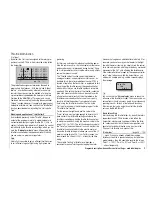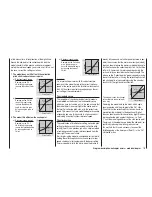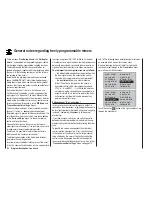
93
Program description: wing mixers – fi xed-wing model
When the camber-changing fl aps are lowered, either
using “
Phase trim
” or by means of a transmitter control
assigned to input “6”, a pitch trim change (up or down)
may occur. Alternatively it may be desirable for slight
down-elevator to be applied automatically when the
fl aps are raised by a small amount, in order to increase
the model’s basic airspeed. This mixer can be used to
achieve both purposes.
When the fl aps are deployed, this mixer causes the
elevator setting to be corrected automatically in propor-
tion to the fl ap defl ection.
The adjustment range is +/- 150%. For this mixer the
“usual” settings are in the single to low two-digit range.
Simultaneously pressing the
cd
or
ef
buttons of the
right-hand touch-key (
CLEAR
) resets an altered value
to 0%.
fl ap
¼
aile
(Flap
¼
aileron)
This mixer causes a variable proportion of the fl ap signal
to be mixed in with the aileron channels 2 and 5 so that
the ailerons follow the movement of the fl aps, albeit
normally with a smaller defl ection.
The adjustment range is +/- 150%. For this mixer the
“usual” settings are around 50%.
Simultaneously pressing the
cd
or
ef
buttons of the
right-hand touch-key (
CLEAR
) resets an altered value
to 0%.
Note:
If you assign a transmitter control to inputs 5 and 6 in
the “
Transmitter control settings
” menu for adjust-
ing the fl ap positions, then you should leave the value
for this mixer at 0%. See the notes on page 89 in this
regard.
diff red
(Differential reduction)
The problem of reduced aileron response in the but-
terfl y confi guration has been mentioned earlier: if aileron
differential is employed, the aileron response on the
landing approach may be adversely affected through
the extreme “up” defl ection of the ailerons, permitting
virtually no further up-movement; on the other hand
the “down” travel has already been reduced by the
programmed differential setting. The overall result is
signifi cantly reduced aileron response compared with
the normal setting of the control surfaces.
In this case you really should use “differential reduc-
tion” if at all possible. This reduces the degree of aileron
differential when you invoke the butterfl y setting using
the airbrake stick. Differential is reduced progressively,
or even eliminated altogether, as the airbrake stick is
moved towards its end-point.
A value of 0% at this point means that the full pro-
grammed aileron differential is retained. A value of 100%
means that the aileron differential is completely elimi-
nated at the
maximum
butterfl y setting, i. e. when the
airbrakes and other glide path control surfaces are fully
extended. If you set a value above 100%, the aileron
differential is eliminated even before full travel of the
airbrake stick is reached.
The adjustment range is 0 to 150%.
Simultaneously pressing the
cd
or
ef
buttons of the
right-hand touch-key (
CLEAR
) resets an altered value
to 0%.
Summary of Contents for mx-16 HOTT
Page 7: ...7 For your notes...
Page 37: ...37 For your notes...
Page 41: ...41 For your notes...
Page 45: ...45 For your notes...
Page 51: ...51 For your notes...
Page 55: ...55 For your notes...
Page 81: ...81 For your notes...
Page 103: ...103 For your notes...
Page 133: ...133 For your notes...
Page 141: ...141 For your notes...
Page 161: ...161 For your notes...
Page 173: ...173 For your notes...
















































